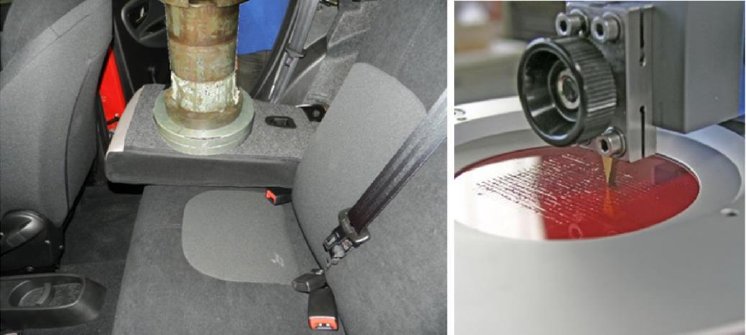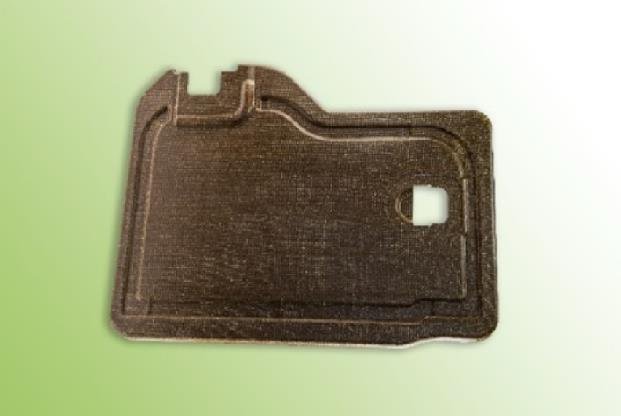In this project 13 partners from industry and research work together to make a rear seat back panel made of a bio-based composite. For the partner Centro Ricerche Fiat (CRF) the main target is weight reduction. “If we substitute the steel panel with a polymer panel we obtain the weight reduction of 56 %, which means that the complete backrest is around 1.5 kg lighter”, says Enrico Mangino from CRF. The second target is cost reduction. In the automotive sector every weight reduction usually leads to an increase of cost. The ECOXY project will maintain the same cost or even reduce the total cost by optimising the process and using a recyclable material. Despite the weight and cost reduction target, the performance of the component must be maintained. The most important requirement for the rear seat back panel is passenger safety: the panel must protect the rear passenger from luggage in the case of a front crash and has to be resistant to heavy loads (figure 2).
For such structural applications in vehicles, fibre-reinforced polymer composites (FRPC) are being used due to their low weight and high mechanical properties. Today, epoxy resins are the most commonly used resin systems in the composite industry. These thermosets materials have a high stability, chemical resistance and improved thermo-mechanical properties. “However, due to their highly cross-linked architecture, thermosets cannot be reprocessed, and are very difficult to be repaired and recycled”, says Rainer Wendel, researcher at the Fraunhofer Institute for Chemical Technology ICT. Therefore, at the end of their use life, thermosets are treated as waste and incinerated, which significantly increases the overall material cost and causes major environmental damage.
The ECOXY consortium found a way to use matrices that are bio-based and make the move towards a bio-based composite which combine flax fibers and a custom made biobased epoxy resin developed by SPECIFIC POLYMERS and capable of competing with current epoxy resins. Rainer Wendel: “These bio-based composites are reparable, reprocessable and recyclable.” These new advanced functionalities are achieved by using cutting-edge chemistry. Instead of using hardeners, which lead to infusible and unreprocessable thermoset matrices, ECOXY proposes the use of dynamic hardeners. These compounds are based on reversible covalent bonds that under certain conditions (temperature and pressure) can rearrange while keeping the crosslink density. This feature gives the materials the new set of reparability, reprocessability and recyclability, while keeping the mechanical properties unaltered at operational conditions. This chemistry proposed in ECOXY is based on recent developments of the company Cidetec, who has recently patented a family of ground-breaking thermoset epoxy resins using reversible chemistry.
Within this project, scientists from the Fraunhofer ICT have produced rear seat back panels made of bio-based composites for the car Lancia Y using a wet compression moulding process (figure 3). “The difficulty in processing thermosets in a wet compression moulding process is the high temperature during curing, which could lead the resin or bio-fibres to burn”, explains Rainer Wendel. “For this purpose, the geometry of the mould has been adapted.”
In addition to the mechanical properties, the ECOXY panel also fulfils aesthetic requirements. This leads to an additional weight reduction, as no textile covering is needed. Scratch and UV-tests ensure the resistance of the developed material.
After the end of ECOXY project, other automotive metal parts will be replaced by the newly developed bio-based polymer material. Possible applications are metal panels with low or medium structural requirements, even with painted finishing. Examples are the roof of a sporty car or the hood of a small car like Fiat 500 or a light commercial vehicle.




